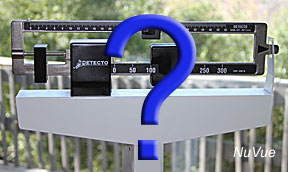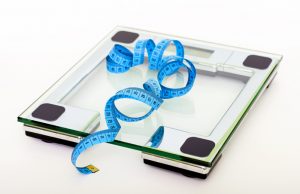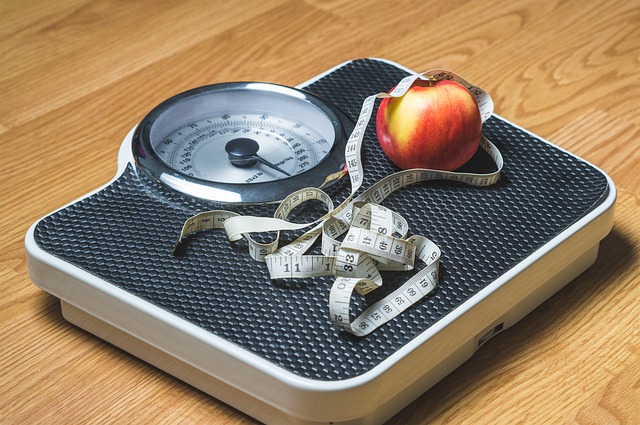To Weigh or Not to Weigh
 Do you want to lose weight?
Do you want to lose weight?
You might be asking should I weigh or not to weigh, that is the question. Whether ’tis nobler in the mind to suffer the slings and arrows of knowing one’s outrageous weight, or to take arms against a sea of bulges by simply ignoring the scale and trying to eat less and exercise more. For some of us, the scale is a tool. For others, it’s the enemy.
So let’s say your plan is to lose 1lb a Week.
Some health and fitness professionals have made a compelling case for ignoring the scale, saying that measuring one’s percentage of body fat is the most accurate way to track one’s fitness level.
It indicates a healthy body composition, regardless of height and weight. I agree that you should know your body fat as a baseline for fitness.
Here are some body fat guidelines according to the American Council On Exercise
Body Fat Percentage for Women
- Athlete: 14-20 percent
- Fit: 21-24 percent
- Average: 25-31 percent
- Obese: > 32 percent
Body Fat Percentage for Men
- Athlete: 6-13 percent
- Fit: 14-17 percent
- Average: 18-24 percent
- Obese: > 25 percent
So why bother weighing yourself at all? When you’re trying to lose weight, it’s important to use any indication you can get that your efforts are paying off. It can take a couple of weeks before you see any difference in body fat. Your weight will change more quickly. Besides, there are relatively inexpensive scales that give you both your actual weight and your percentage of body fat.
My personal prejudice is to weigh yourself at least once every week or two. I do, and I find that facing my weight on a regular basis helps me stay motivated. Believe me, there have been times when I’ve dreaded getting on that scale. But I do it anyway because no matter what it says, I feel relief. I find it liberating. Why? Because now I know where I am and what I need to do next. It helps me maintain a healthy weight.
In my practice, I have helped hundreds of people lose weight. And many of them initially fight me about getting on the scale, and I understand this because I know that terror. Part of the process of losing weight is to prepare oneself to do it. If you are not psychologically ready to lose, stepping on the scale can be a real turnoff and actually deter you from losing weight. But once you’re ready, facing that number can jump-start your weight-loss program and keep you going.
 I give my clients a baseline of their body fat percentage and get them to use the scale. Then we set up a diet and exercise plan. You can lose weight by diet alone. But dieting can reduce muscle mass along with fat. This becomes ever more important as we age. We can lose as much as 6 pounds of muscle tissue per decade as we age. And metabolism can slow down as much as 3 percent per decade. You can see that if left unchecked, you’re on a slow boat to obesity. Adding an exercise program may be all you need to turn this process around. Cardio exercise burns calories, and strength training raises your metabolism and builds lean muscle mass while you are losing. Losing about 1 percent body fat a month and one to two pounds a week is considered safe and realistic. Here’s the winning combination. Reduce calorie intake with diet, do cardio most days to burn calories, and strength train at least a couple of days a week to build muscle mass and increase metabolism.
I give my clients a baseline of their body fat percentage and get them to use the scale. Then we set up a diet and exercise plan. You can lose weight by diet alone. But dieting can reduce muscle mass along with fat. This becomes ever more important as we age. We can lose as much as 6 pounds of muscle tissue per decade as we age. And metabolism can slow down as much as 3 percent per decade. You can see that if left unchecked, you’re on a slow boat to obesity. Adding an exercise program may be all you need to turn this process around. Cardio exercise burns calories, and strength training raises your metabolism and builds lean muscle mass while you are losing. Losing about 1 percent body fat a month and one to two pounds a week is considered safe and realistic. Here’s the winning combination. Reduce calorie intake with diet, do cardio most days to burn calories, and strength train at least a couple of days a week to build muscle mass and increase metabolism.
So, I’ve made my case for using the scale as a tool, and I hope you’ll try it when you are ready. Regardless, to be or not to be at a healthy weight should not be in question.
Mirabai Holland MFA, EP-C, CHC is one of the foremost authorities is the health and fitness industry. Her customer top rated exercise videos for Age-Onset health issues like Osteoporosis, Arthritis, Heart Disease, Diabetes & more are available at www.mirabaiholland.com. Mirabai also offers one-on-on Health Coaching on Skype or Phone. Contact her at askmirabai@movingfree.com.

